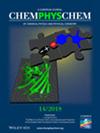分子断裂作为从对氢中获取超极化化合物的策略。
IF 2.3
3区 化学
Q3 CHEMISTRY, PHYSICAL
引用次数: 0
摘要
超极化显著地增加了分子在磁共振光谱和成像中的可探测性。除了硬件和催化剂设计的最新进展之外,本文还讨论了利用超极化目标分子固有的化学反应性作为扩大对氢基方法的范围和多功能性的策略。各种断裂反应被认为有可能产生其他难以获得的超极化物质,从而扩大了潜在的应用。本文章由计算机程序翻译,如有差异,请以英文原文为准。
Molecular Fragmentation as a Strategy to Access Hyperpolarized Compounds from Para-Hydrogen.
Hyperpolarization significantly increases the detectability of molecules in magnetic resonance spectroscopy and imaging. Beyond recent advancements in hardware and catalyst design, this article discusses harnessing the inherent chemical reactivity of hyperpolarization target molecules as a strategy to expand the scope and versatility of para-hydrogen-based methods. Various fragmentation reactions are considered for their potential to generate otherwise inaccessible hyperpolarized species, thereby broadening potential applications.
求助全文
通过发布文献求助,成功后即可免费获取论文全文。
去求助
来源期刊

Chemphyschem
化学-物理:原子、分子和化学物理
CiteScore
4.60
自引率
3.40%
发文量
425
审稿时长
1.1 months
期刊介绍:
ChemPhysChem is one of the leading chemistry/physics interdisciplinary journals (ISI Impact Factor 2018: 3.077) for physical chemistry and chemical physics. It is published on behalf of Chemistry Europe, an association of 16 European chemical societies.
ChemPhysChem is an international source for important primary and critical secondary information across the whole field of physical chemistry and chemical physics. It integrates this wide and flourishing field ranging from Solid State and Soft-Matter Research, Electro- and Photochemistry, Femtochemistry and Nanotechnology, Complex Systems, Single-Molecule Research, Clusters and Colloids, Catalysis and Surface Science, Biophysics and Physical Biochemistry, Atmospheric and Environmental Chemistry, and many more topics. ChemPhysChem is peer-reviewed.
 求助内容:
求助内容: 应助结果提醒方式:
应助结果提醒方式:


